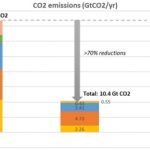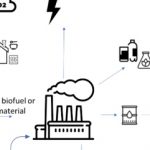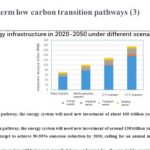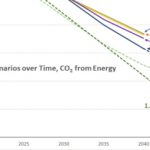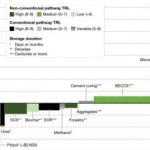The world needs a large supply of renewable carbon to replace fossil feedstocks for hard-to-abate sectors like aviation, shipping, chemicals, food and beverage. Arno van den Bos, Karan Kochhar, Luis Janeiro and Francisco Boshell at IRENA present the results of their study to estimate demand, and whether supply can match it through to 2050. The main sources of supply come from alcoholic fermentation, biogas, pulp & paper, and biomass. Each has … [Read more...]
How much Carbon Capture does the EU need from LULUCF, BECCS, Industrial CCS, DACCS?
How much carbon capture does the EU need to 2050? Robert Jeszke and Michał Lewarski at The National Centre for Emissions Management (KOBiZE), writing for the Florence School of Regulation, start by pointing out that mainstream estimates vary significantly, from 50-300 Mt CO2 to 1,300-1,500 Mt CO2. They then present their study (their estimate is 550 Mt CO2). The study highlights the importance of BECCS (Bioenergy with Carbon Capture and Storage): … [Read more...]
Event summary: “Bioenergy after REDIII – sustainable, climate neutral fuels for industry, transport and negative emissions”
Sara Stefanini provides a written summary of our panel discussion held on Wednesday 4th October 2023. It’s a full summary of the 75 minute discussion, and begins conveniently with a summary of the highlights. Under the recently revised Renewable Energy Directive (REDIII) bioenergy can be counted towards the renewable energy targets – provided that it meets strict sustainability criteria. Bioenergy already accounts for 60% of the EU’s renewable … [Read more...]
Event summary: “Unlocking the potential of Bioenergy”
Sara Stefanini provides a written summary of our panel discussion held on Thursday March 17th 2022. It’s a full summary of the 90 minute discussion (including audience questions), but it begins conveniently with a summary of the highlights (potential for bioenergy, hard-to-abate sectors, sustainability, policy needs). Those highlights include the need to scale bioenergy up from around 50 EJ today to 150 EJ by 2050; the importance of carbon … [Read more...]
Renewed interest in Carbon Capture strategies for net-zero: targets, obstacles, costs, priorities
Martina Lyons at IRENA picks out the highlights of their new report “Reaching Zero with Renewables: Capturing Carbon”. Carbon capture is going to be expensive, so should be focussed on hard-to-abate industrial sectors, as well as bioenergy plants. Lyons breaks down the target carbon capture volumes, costs and the investments required, as well as looking at the consequences of different strategies and carbon prices. Scaling up this technology, … [Read more...]
How much Carbon Capture will Germany need? Both nature-based and technological
Yet more studies have been published that show Germany needs carbon removal to meet its emissions targets. Simon Göss and Hendrik Schuldt at cr.hub add two, from the German Energy Agency and the Ariadne report (funded by the German Ministry of Education and Research), to those that already exist to shine more light on a carbon capture pathway. The main observation is that nature-based solutions (LULUCF: land use, land use change and forestry) … [Read more...]
Comparing four Carbon Removal scenarios (IPCC, IEA, McKinsey, NGFS) and policy implications
Most net-zero scenarios include carbon removal as a major component. Simon Göss and Hendrik Schuldt at cr.hub review five major scenarios from the IPCC, IEA, ETC, McKinsey, and the Network for Greening the Financial System (NGFS). They start by making the very important distinction between carbon capture and negative emissions: capturing carbon from, say, a gas plant does not deliver negative emissions, it just prevents new emissions. This … [Read more...]
Biden’s Leaders Summit: turning climate commitments into solutions
President Biden's Leaders Summit on Climate last month helped focus minds on making firm commitments to reducing global emissions. As we all know, targets are one thing, credible and realistic solutions are another. To understand the challenge better, Dolf Gielen, Ricardo Gorini and Gayathri Prakash at IRENA break down into themes those areas that need much more effort and, if dealt with successfully, can get us to net zero by 2050: structural … [Read more...]
Bioenergy is the undervalued pillar of the clean energy transition
Bioenergy is already the world’s largest source of renewable energy, responsible for 70% of the supply (and around 10% of total primary energy). Burning organic matter goes back to the invention of fire and is still commonplace around the globe. Yet it gets hardly any of the attention and policy support that’s given to other clean energy technologies like solar, wind and now hydrogen. Bioenergy can and should play an even greater role, explain … [Read more...]
Chinese energy institutes present new net-zero scenarios for 2050
It was just one sentence, in September, from China’s President Xi Jinping: “We aim to have CO2 emissions peak before 2030 and achieve carbon neutrality before 2060.” Already, leading Chinese energy institutes have presented two scenarios that lay out what needs to be done to meet that goal. Writing for Carbon Brief, Lauri Myllyvirta reviews the plans. Both aim for over 85% of all energy and more than 90% of electricity coming from non-fossil … [Read more...]
Promises of future tech make hitting the 2°C target harder: a history
Writing for Carbon Brief, Duncan McLaren at Lancaster University runs through the history of climate negotiations to show that, over “five phases”, the continuous overhauling of models and target-setting have always resulted in promises to reverse emissions sometime in the future, a poor substitute for the real job of cutting emissions now. His main criticism is aimed at future carbon capture (CCS, BECCS) and net-zero-by-2050 policies: anything … [Read more...]
IEA’s WEO 2019 scenarios won’t hit the Paris targets, again. It must start telling us what will
As always, the energy world is abuzz with reactions to the IEA’s annual World Energy Outlook, published yesterday. As always, it’s getting plenty of criticism from those who say it lacks ambition, and in doing so will again get quoted to justify support for continued reliance on fossil fuels, explains Kelly Trout at Oil Change International. The IEA’s most ambitious pathway, the Sustainable Development Scenario (SDS), gives a 66% chance of … [Read more...]
10 Carbon Capture methods compared: costs, scalability, permanence, cleanness
We need to understand carbon capture, storage and utilisation (CCUS) better. To do so, this article looks at 10 methods and estimates how much CO2 each will take out of the atmosphere by 2050, and the cost per tonne. In their list the authors, Ella Adlen and Cameron Hepburn at the University of Oxford, cover the industrial (e.g. CO2-EOR, synfuels) to the biological (e.g. forestry, soil carbon sequestration). They say there are six that can be … [Read more...]









